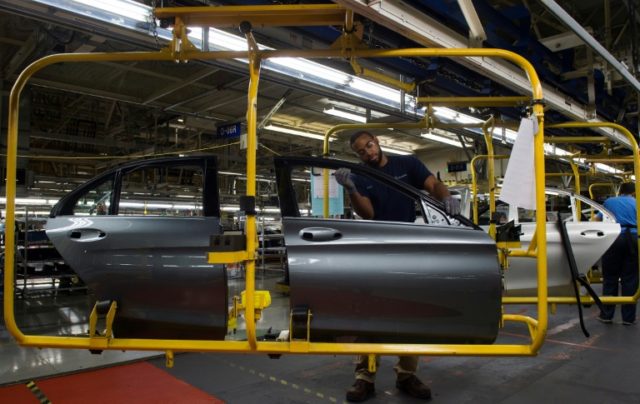Washington (AFP) – The US manufacturing sector slowed from its torrid pace in March amid growing concerns about trade tensions and tariffs on steel and aluminum, according to an industry survey released Monday.
The price measure rose to its highest level in seven years, while orders, production and employment all slowed, the Institute for Supply Management said.
While demand remains high, all sectors also are suffering from a shortage of workers and a shortage of skills, said Timothy Fiore, chair of ISM’s Manufacturing Business Survey Committee.
But he said 32 percent of survey respondents expressed concerns about the tariffs imposed by President Donald Trump on March 23, which impact all sectors, in particular food. Another 10 percent commented on rising prices.
ISM’s monthly Purchasing Manufacturer’s Index slipped 1.5 percentage points from February to 59.3 percent, slightly below the consensus forecast among economists.
The index for new orders fell 2.3 points, while production dropped a point and employment fell 2.4 points, although all remain in healthy expansion mode. Any reading above 50 percent signals growth.
But prices jumped 3.9 points to 78.1, the highest level since April 2011.
That surge “was primarily because of the tariffs. A lot of our industry sectors use steel and aluminum in their conversion activities,” Fiore told reporters.
Suppliers began to raise prices within 24 hours of the announcement and also stockpiled the metal in anticipation of being able to sell at a higher price. The price of steel jumped to $860 a ton from $720 previously.
While he was upbeat on the outlook for growth due to strong demand, Fiore said if the trade tension with China “continues to accelerate I would expect that you would see some break on expansion just due to general confusion here.”
For now the growth of manufacturing remains slightly above the six-month average, with all six big industries expanding, and “no serious disruptive movements,” he said.
But labor issues continue to impose a constraint on growth since it is an issue “throughout the supply chain, our companies and their suppliers.”

COMMENTS
Please let us know if you're having issues with commenting.